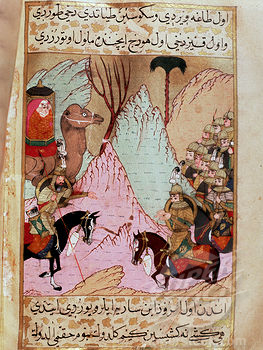Political aspects of Islam
Political aspects of Islam are derived from the Qur'an, the Sunna (the traditions of Muhammad), Muslim history, and elements of political movements outside Islam. Traditional views of Islam regard religion and state as one, with the concept of a Caliphate representing the political unity of the entire Muslim community (Ummah). However, the relationship between religion and politics in Islam has been a subject of debate and change over the centuries.
Foundations[edit | edit source]
The foundational source for the political aspects of Islam is the Qur'an, which Muslims believe to be the direct word of God as revealed to Muhammad. The Sunna, comprising accounts of Muhammad's sayings and actions, also serves as a guide. Key concepts derived from these sources include the Sharia (Islamic law), which covers both personal conduct and governance, and the notion of Jihad, which has both an inner spiritual meaning and an outer physical aspect, often interpreted as the duty to struggle in the way of God, including, historically, through military means.
Caliphate and Governance[edit | edit source]
The concept of the Caliphate, which is the Islamic form of governance led by a Caliph (successor) to Muhammad, is central to traditional Islamic political theory. The first four caliphs after Muhammad's death are known as the "Rightly Guided" or "Rashidun" Caliphs, and their rule is considered the ideal form of Islamic governance. Over time, the Caliphate evolved and expanded, eventually developing into various dynasties, such as the Umayyad and Abbasid caliphates.
Modern Interpretations and Movements[edit | edit source]
In the modern era, the political aspects of Islam have diversified. Some Muslims advocate for a secular state, separating religion and politics, while others strive for the implementation of Sharia through the state. Islamist movements, seeking to establish states based on Islamic principles, vary widely from the moderate to the extreme. Prominent examples include the Muslim Brotherhood in Egypt and the more radical interpretations that led to the establishment of groups like ISIS.
Democracy and Human Rights[edit | edit source]
The compatibility of Islam with democracy and human rights is a topic of intense debate. Some argue that Islamic principles support democratic values, citing early Islamic consultative practices like Shura (consultation). Others contend that certain interpretations of Sharia are incompatible with Western concepts of democracy and human rights, particularly regarding freedom of religion, gender equality, and freedom of expression.
Contemporary Challenges[edit | edit source]
Contemporary challenges in the political aspects of Islam include governance in Muslim-majority countries, the role of Islam in public life, and the relationship between the Muslim world and the West. Issues such as the rise of Islamist terrorism, the debate over Islamophobia, and the struggle for reform in various Muslim societies are at the forefront of these challenges.
Conclusion[edit | edit source]
The political aspects of Islam are complex and multifaceted, reflecting the diversity of interpretations and practices within the Muslim world. While rooted in the early sources of Islam, political expressions of the faith continue to evolve in response to changing historical and social contexts.
Search WikiMD
Ad.Tired of being Overweight? Try W8MD's physician weight loss program.
Semaglutide (Ozempic / Wegovy and Tirzepatide (Mounjaro / Zepbound) available.
Advertise on WikiMD
|
WikiMD's Wellness Encyclopedia |
| Let Food Be Thy Medicine Medicine Thy Food - Hippocrates |
Translate this page: - East Asian
中文,
日本,
한국어,
South Asian
हिन्दी,
தமிழ்,
తెలుగు,
Urdu,
ಕನ್ನಡ,
Southeast Asian
Indonesian,
Vietnamese,
Thai,
မြန်မာဘာသာ,
বাংলা
European
español,
Deutsch,
français,
Greek,
português do Brasil,
polski,
română,
русский,
Nederlands,
norsk,
svenska,
suomi,
Italian
Middle Eastern & African
عربى,
Turkish,
Persian,
Hebrew,
Afrikaans,
isiZulu,
Kiswahili,
Other
Bulgarian,
Hungarian,
Czech,
Swedish,
മലയാളം,
मराठी,
ਪੰਜਾਬੀ,
ગુજરાતી,
Portuguese,
Ukrainian
Medical Disclaimer: WikiMD is not a substitute for professional medical advice. The information on WikiMD is provided as an information resource only, may be incorrect, outdated or misleading, and is not to be used or relied on for any diagnostic or treatment purposes. Please consult your health care provider before making any healthcare decisions or for guidance about a specific medical condition. WikiMD expressly disclaims responsibility, and shall have no liability, for any damages, loss, injury, or liability whatsoever suffered as a result of your reliance on the information contained in this site. By visiting this site you agree to the foregoing terms and conditions, which may from time to time be changed or supplemented by WikiMD. If you do not agree to the foregoing terms and conditions, you should not enter or use this site. See full disclaimer.
Credits:Most images are courtesy of Wikimedia commons, and templates, categories Wikipedia, licensed under CC BY SA or similar.
Contributors: Prab R. Tumpati, MD





